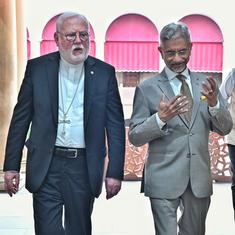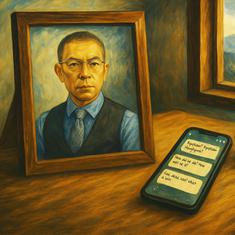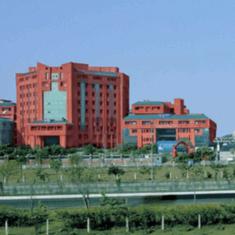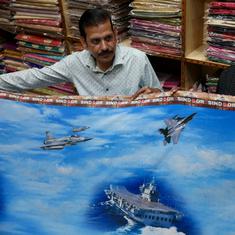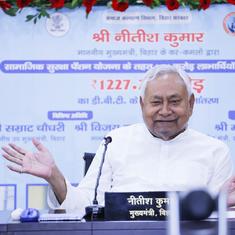In April 1883, one of the leading newspapers in Calcutta, The Statesman, received a colourful letter from an irate reader:
“Your treachery all along to me led me to no other expectations from such a JUDAS as you are. You have been, and are still, trying to mislead the public and throw dirt upon my good name, and had I time and did I consider it worth the trouble I should put you in JAIL as I did your confrere in Hong Kong, and where such curs like you ought to be. Publish this letter intact if you have the courage. But you have NOT. You can only stab in the dark like a COWARD.”
The writer of the letter was Daniel Bandmann, a German-born American who belonged to the select club of the earliest world-travelling actor-managers who set up their own companies and controlled every aspect of their productions.
Convinced of his artistic rightness, Bandmann did not suffer self-doubt or at least did not show it. As historian Lisa Warrington notes in the Journal of Global Theatre History, any criticism from a newspaper of his acting or accent (or even the suggestion that he imitated his contemporaries) could elicit an immoderate response. That is what the editors of The Statesman were finding out too in the summer of 1883.
The Calcutta newspaper did not cow down, though. According to The Otago Witness, a Kiwi publication, The Statesman ran an animated reply, beginning with the words, “Whatever other charges can be brought against the talented actor, no one can accuse him of being a gentleman.” As for his threat of legal proceedings and remarks about the press, The Statesman dismissed them as deserving nothing but “hearty contempt” and “unmitigated scorn.”
In the course of his nearly five-decade career, such exchanges were not unusual for Bandmann. Starting in Germany and Europe, he travelled all over the world, from the US and Australia to South East Asia, India and China, and in many places, he left behind a trail of acrimony. But such was his itinerary that it prompted writer Lewis Stransg to remark that Bandmann “performed Shakespeare in more outlandish places than any actor that ever lived”.
Start in theatre
Daniel Edward Bandmann was born on November 1, 1839, in Kassel in Germany’s Hesse province. Publicity material for his 1869 Australia tour says that he was drawn to the stage quite early: in his youth, he performed scenes from the Bible, playing all the parts, including in a play on Adam and Eve. During this time, he was also a student of Carl Grunert, the poet and writer associated with Stuttgart’s 100-year-old Hof-Theatre.
Sometime in the early 1850s, he travelled to the US with his parents, Solomon Bandmann and Rebecca Katz. The older Bandmann is listed as a liquor dealer in official New York documents. By now, the younger Bandmann had found his calling too. In 1858, he returned to Germany as a naturalised American citizen and made his debut as a stage actor in the Court Theatre of the town Neustrelitz. Five years later, he was back in the US, performing in the Bowery district in New York’s Lower Manhattan.
![Credit: The Theatre Magazine Co./Wikimedia Commons [Public Domain]](https://sc0.blr1.cdn.digitaloceanspaces.com/inline/fuzsgjhrlg-1667911195.jpg)
Bandmann’s first triumph was as Shylock in a production of The Merchant of Venice at Niblo’s Garden – a role he got after some quick English lessons. For the next five years, he inhabited the role to great acclaim, providing a glimpse of his career journey. While Bandmann’s initial preferences were melodramas and adaptations of contemporary novels, it was his interpretation of Shakespearean characters – Shylock, Hamlet, Iago and Othello – that won him plaudits. In 1868, in a speech in London before the actors’ group Theatrical Fund, he emphasised that Shakespeare, although born in England, belonged to the world.
As he earned fame onstage, he gained notoriety offstage. Over time, he became known for short-changing actors, philandering, violence and testiness. He would lash out at critics, sometimes petulantly and sometimes understandably when they emphasised his pronounced German accent. Actors in his company loathed being part of a fighting scene with him, for Bandmann was known to assume it was the “real thing”.
Sights and sounds
In all likelihood, it was the success of his tours in Germany and his performances in New York in the 1860s that encouraged Bandmann to set up his own theatre company. With this company, he left on a second world tour in 1879 after some mixed reviews from the British and American presses. It was his hope that the travels would reinvent him.
Although mostly a one-man set-up, he was accompanied on this tour by his leading lady of the time, the Canadian actor Louise Beaudet, with whom he was romantically involved. His company spent several months in Australia, New Zealand, Singapore and Ceylon, before finally arriving in Madras on The Pekin on December 11, 1881. In his memoir, Bandmann recalls his first experience of sleeping under the punkah in Madras. Operated by coolies, Bandmann says, the punkah gave him necessary protection against the legions of mosquitoes that buzzed around him.
![Bandmann as Hamlet. Credit: William M. Hunt/Wikimedia Commons [Public Domain].](https://sc0.blr1.cdn.digitaloceanspaces.com/inline/qixlfpwivp-1667911236.jpg)
From Madras, the company travelled to Calcutta, which was the “perfect wonderland of Oriental magnificence and grandeur”. The company arrived in the eastern city just as the Viceroy’s government had returned from the summer capital Shimla, and for its members as well as commoners, Bandmann’s company promised a novel form of entertainment. As he writes:
“It was a sight of indescribable interest to behold three thousand black faces turned on the stage, and there were hundreds of their zenanas in the boxes, who could see us acting, though we could not see them. They followed the play with rapt attention, and it was evident from the succession of pauses, in which one might have heard a pin drop, and outbursts of applause which would have drowned a thunder-clap, that they not simply watched the movement of events and the changed relations of the personages of the play, but, in a most philosophical way, entered into the secret, inner life of each of them, and comprehended the entire development of the plot.”
Bandmann describes in his memoir An Actor’s Tour, or Seventy Thousand Miles with Shakespeare the sights and sounds of Calcutta: the big houses, their massive gateways, wraparound balconies, and not too many windows (to keep out the glaring sun). He writes that, for most Calcutta residents, a carriage ride along the Maidan – the grassy expanse right in the city’s heart – was the preferred outing.
“One meets with vehicles of every conceivable shape, size, height, and beauty of design, decorated with an infinite variety of arms and pedigrees, drawn by handsome fiery-footed Arabian steeds, and attended by a host of coachmen, grooms, and lackeys.”
The carriages rolled to the beautiful tropical grounds called the Eden (later Eden Gardens), where a band played music every evening for an hour, evoking, for Bandmann, scenes out of the Arabian Nights. The roads were watered twice every day, once at dawn and once at dusk, by carriers who hauled four-five buckets of water in their leather bags.
Lasting impression
Like other travellers before him, Bandmann was surprised by the size of the staff that had to be employed. A person in moderate circumstances had six servants, a rich man about 24, and a rajah about 100 of them. At the very least, Bandmann says, one had to employ “a groom, a syce, a water carrier, a cook, a khitmatgar (steward) and a boy”. The size of the staff did not, however, guarantee a work ethic: in an injudicious remark, he notes that servants had no sense of gratitude and as proof offers the fact that one of them forged his signature for a recommendation letter.
His plays were performed at the Corinthian, the largest and grandest theatre in Calcutta. Staged first was Albert Brachvogel’s Narcisse, in which he essayed the eponymous character, followed by Hamlet and others. Many audience members were impressed by Bandmann, including the maharajas of Coochbehar and Darbhanga, the latter of whom appreciated his Shylock. But on Bandmann, the one who left an impression was the reformer Keshub Chunder Sen. Bandmann describes Sen as “having a grand, imposing, athletic figure, a noble bearing”, and a dignity that reminded him of a Roman patrician. Left in awe, Bandmann modelled his Othello on Sen.
From Calcutta, the company travelled by train to Bombay, which Bandmann found “a most pleasant city”. The rich lived in their splendid villas on Malabar Hill, just four miles from the heart of Bombay, and in between lay a scenic drive with commanding views of the harbour.
![Mora, New York/Harvard Theatre Collection/Wikimedia Commons [Public Domain]](https://sc0.blr1.cdn.digitaloceanspaces.com/inline/ksdgxgiheo-1667912241.jpg)
Over his travels, Bandmann found Indians largely “kind-hearted, quick in perception, and hospitable”. Every New Year’s Day, he says, they gifted cakes and baskets of nuts and fruit to friends and this sustained Bandmann and his company for well over a month. He was struck by how many of them wanted to be lawyers. Perhaps, he reasons, it was because “there are so many different castes who hate each other, the quarreling is constant, and the courts are crowded from the beginning to the end of the year”.
Final years
On his return to the US, he was again at the centre of controversies. His co-actor Louise Beaudet took him to court over contractual issues. And in 1893, actor Millicent Palmer, to whom he was married, sued him for bigamy and violence when he also married Mary Therese Kelly.
In his later years, Bandmann bought a ranch in Missoula county in Montana, a state he had visited during his barnstorming tours. He became famous for introducing a new variety of apple and importing horses from France and cattle from Germany. He died there in 1905. In his memory, the university at Montana instituted the Daniel E Bandmann award for a time for excellence in theatre.
A few of Bandmann’s children followed in his steps, especially his children by Millicent Palmer – Lily Clementine and Maurice Bandmann. Historian Christopher Balme writes that Maurice became a theater impresario like his father, with his companies performing across Asia and the Mediterranean. Maurice is known in India too – as one of the founders of the Royal Opera House in Mumbai, which was restored to its glory in 2016.
This article is part of a series on notable Americans who visited India before mid-20th century. Read the rest of the series here.



